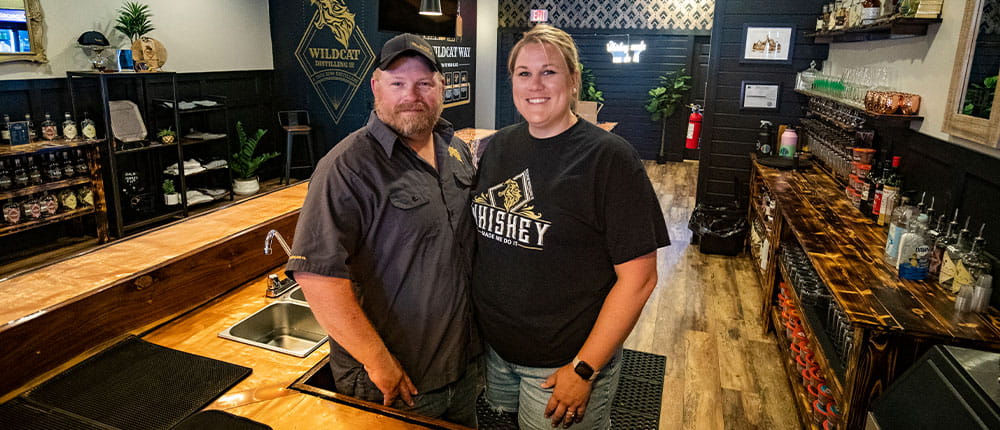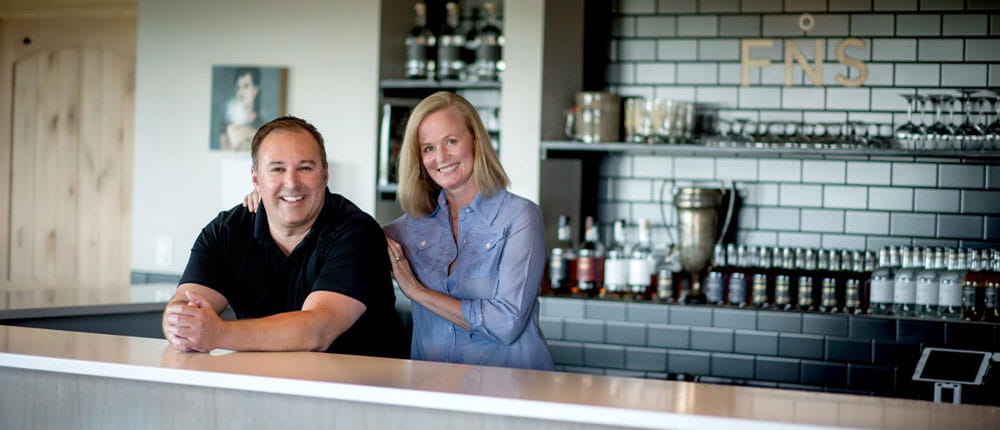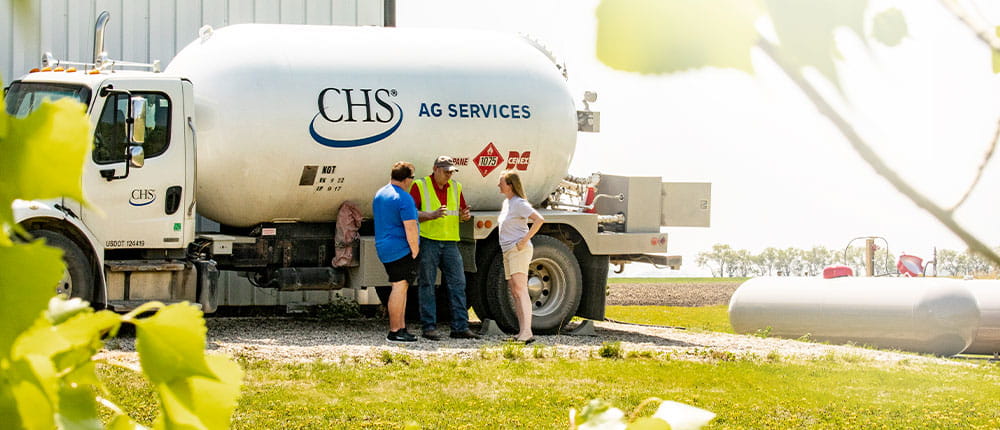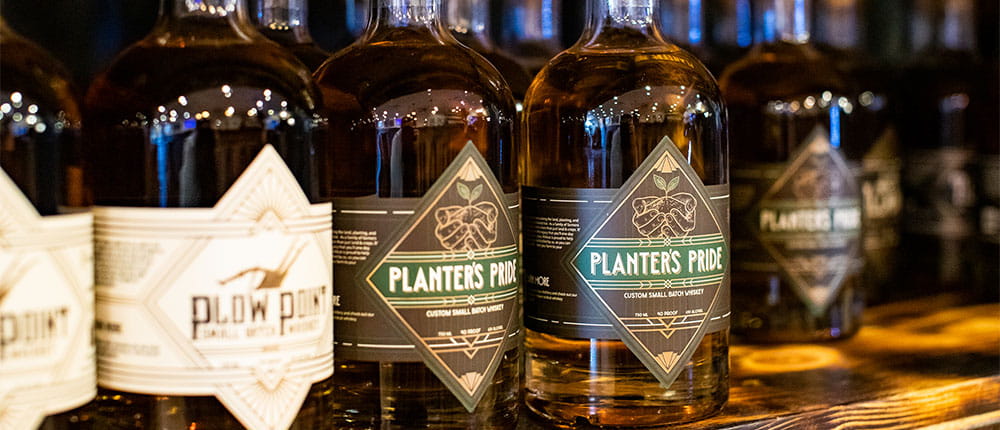Wildcat Distilling Co. was named for Wildcat Cave, where infamous outlaws Bonnie Parker and Clyde Barrow hid out after robbing a nearby bank. At least that’s the story told around Duncombe, Iowa, say distillery owners and siblings Brad Lemke and Alissa Nelson.
“Our grandparents told us the story about Bonnie and Clyde,” Nelson says. “We’re not sure if it’s true, but it makes sense, since they often hid out in secluded areas and robbed three gas stations in the area. The story is part of local lore and it’s fun to tell to customers who ask how the distillery got its name.”
Another on-farm distillery with a unique claim to fame is Far North Spirits. Only miles from the Canadian border near Hallock, Minn., the business lives up to its name as the northernmost maker of liquor in the contiguous United States.
“We take ownership of the claim since part of our farm where we grow rye for our whiskey is a few degrees farther north than a distillery in Baudette, Minn.,” says Cheri Reese, who owns Far North with her husband, Michael Swanson. “We’re one of only a handful of U.S. distilleries that grows our own grain.”
Wildcat Distilling started making whiskey in 2020 and Far North began seven years earlier with the same goal: to bolster revenues to preserve the family farm for future generations. The best way to do that, each determined, was to add value to grain by turning it into whiskey and other liquor.
“We’re a smaller farm [460 acres] that can’t compete on volume alone,” Lemke says. “If you look back through history, the primary use for grain that wasn’t sold for food or livestock feed has been alcohol.”
He says customers appreciate the farm-to-glass story, which they call “till, mill and distill.”
 Brad and Amanda Lemke, co-owners of Wildcat Distilling Co., prepare to serve customers at the distillery’s tasting room in Webster City, Iowa.
Brad and Amanda Lemke, co-owners of Wildcat Distilling Co., prepare to serve customers at the distillery’s tasting room in Webster City, Iowa.
Wildcat way
Lemke started farming his family’s land in 2014, a few years after his grandfather, Alvin Isakson, retired. In 2017, Lemke remembers selling corn for $3.10 per bushel, well below breakeven for the state.
That tough year is seared into Lemke’s memory. “We needed another steady income source to survive.”
Lemke, Nelson and their spouses decided to use their talents and the marketing hook of the cave to cash in on the artisanal spirits craze. U.S. craft spirits sales are growing 10.4% annually, according to the American Craft Spirits Association.
Lemke, a former operations manager with a fertilizer manufacturer, is the head distiller due to his knowledge of chemical processes. His wife, Amanda Lemke, runs the Wildcat Distilling tasting room in nearby Webster City, Iowa. Nelson and her husband, Tony Nelson, have full-time jobs in creative design and marketing and sales, respectively, and use their skills to promote and support the business.
About 20% of the farm is devoted to growing grain for whiskey, including yellow corn, Jimmy Red corn, hard red winter wheat, cereal rye, barley and sorghum. Corn is the primary grain used.
“We pride ourselves on being a farm-to-bottle distillery. It doesn’t take much grain to make a batch of whiskey — about 600 pounds or just over 10 bushels,” Lemke says. A batch typically fills 24 to 48 750-milliliter bottles, sometimes more. Whiskey yield varies due to corn starch content and fermentability.
“There’s quite a bit of value [turning grain into whiskey],” he continues. “If corn is worth $3 per bushel, we can make it worth almost $80 per bushel.”
There’s a learning curve to adding specialty crops and small grains to what had been a simple corn-soybean crop rotation, Lemke says. Agronomists with Landus Cooperative, based in Ames, Iowa, help the operation acquire seed, fertilizer and other inputs and provide agronomic advice.
“I planted grain sorghum for the first time this year to make a new whiskey. When I had questions about seeding depth and rate and crop protection, Landus came through,” Lemke says.
Helping farmer-owners succeed is the primary goal, says Matt Carstens, Landus president and CEO.
“We’re farmer-focused and our job is to provide them with everything they need,” he continues. “Whether it’s a value-added venture or not, we remain diligent on providing opportunities to help family farmers.”
Wildcat Distilling sells six whiskeys ranging in price from $28 to $42 per bottle, with plans to expand production to include bourbon and other spirits. The team’s production goal is 380 bottles per week. Wildcat products are sold by regional retailers, including Hy-Vee stores.
Wildcat Distilling Co.
Products:
- Harvest Moon, a white corn whiskey made with apples and cinnamon
- Honey Moon, a white corn whiskey made with Iowa honey
- Woodshed Red, a corn whiskey made from 100% Jimmy Red corn
- Planter's Pride, Plow Point and Tillman’s small batch whiskeys
Awards: Tillmans Small Batch Whiskey, bronze medal, American Distilling Institute International Spirits Competition, 2023
Fun fact: Wildcat Cave is a limestone formation carved out of sandstone bluffs by the creek running below it. Mountain lions and bobcats reportedly made dens inside. A speakeasy operated in a barn atop Wildcat Cave during U.S. prohibition in the 1920s and early ’30s.
 Cheri Reese and Michael Swanson own Far North Spirits, an on-farm distillery and tasting room near Hallock, Minn.
Cheri Reese and Michael Swanson own Far North Spirits, an on-farm distillery and tasting room near Hallock, Minn.Far North dreams
Reese grew up in tiny Hallock and Swanson was raised on a farm near town. While they loved the quiet beauty of the Red River Valley, both dreamed of living in a bustling city with rewarding careers and endless entertainment options.
After more than two decades of living that dream, most recently in St. Paul, Minn., the couple yearned for a “simpler life.” Years of stressful work in public education consulting for Reese and pharmaceutical marketing for Swanson caught up with them.
“We needed something that would feed our souls,” Reese recalls. “We wanted to do something with the farm, but it’s hard to be profitable with 1,200 acres and we didn’t want to scale up.”
A business plan for a craft distillery that Swanson wrote for an MBA course in 2009 sparked another dream: turning homegrown grain into world-class spirits. The couple quit their jobs, moved to the family farm and built a distillery, which opened in 2013.
“The idea is to take grain from a fraction of the acreage to make and sell a finished product that generates as much or more revenue than the entire farm can make selling grain,” Swanson says. A neighbor rents the rest of the land.
Swanson grows several varieties of rye — mostly Hazlet, which gives whiskey a unique flavor — and some heirloom corn on 200 acres. Far North makes several kinds of whiskey, gin and rum. All products have Scandinavian names, like Roknar, to embrace their heritage. They retail for $30 to $50 per bottle.
“Our brand is solid. The farm is our differentiator, which helps us compete nationally and internationally,” Reese says.
Products are sold at retailers and restaurants throughout the U.S. and on the company’s website through a third-party vendor. Viking, which runs ocean and river cruises in the U.S. and Europe, is a Far North customer.
Sales are strong, the couple notes, but increased competition and regulations are a challenge. The number of U.S. craft distilleries nearly doubled to 2,290 from 2015 to 2021, according to the American Craft Spirits Association.

Michael Swanson, left, and Cheri Reese, right, co-owners of Far North Spirits, talk to Harlen Iverson, Ģ��ֱ�� Ag Services, about future propane deliveries. The business uses about 14,000 gallons a year. A propane-fired boiler heats the building, stills and mash cooker.
Getting up to date on farming techniques and technology was daunting, Swanson says. Ģ��ֱ�� Ag Services in Hallock provides advice and ag inputs. Ģ��ֱ�� also supplies 14,000 gallons of propane annually to heat the distillery and its stills.
“When it’s 30 degrees below zero, you can’t run out of propane,” says Reese. “Our stills run almost all week to keep up with demand. Harlen Iverson, our propane delivery driver, doesn’t let us run out.”
The couple has embraced the return to their ag roots, sporting T-shirts that say, “Who’s your whiskey farmer?”
“We have a unique Midwest story,” says Reese, “and a lot of people want to hear it.”
Far North Spirits
Products:
- Roknar, a Minnesota rye whiskey
- Bodalen bourbon whiskey
- Four limited-release Roknar whiskeys
- Solveig and Gustof gins
- Three kinds of Alander rums (spiced, white and aged)
Awards:
- Best bourbon in Minnesota, Heartland Whiskey Competition, 2019
- Four-time winner Good Food Awards, 2016 (gin), 2021 (rye), 2023 (bourbon and rum)
- 2023 best buy, Wine Enthusiast, 2023 (Alander spiced rum and Alander white rum)
Fun fact: The Swanson century farm’s rich soils are thanks to the vast Ice Age body of water called Lake Agassiz, formed from meltwaters of a glacier that covered much of central North America 10,000 to 30,000 years ago. Far North is the first U.S. farm distillery to be Bee Friendly Farming-certified by Pollinator Partnership.




